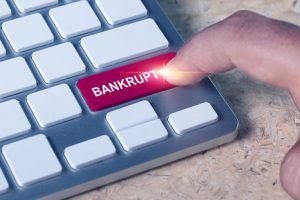A.D.K. Arms Files Bankruptcy

Aggressive debt collection tactics may have forced the firearms manufacturer into bankruptcy. Do ordinary people file bankruptcy for the same reason?
A.D.K. and its affiliate company, Advanced Precision Manufacturing, Inc., sought Chapter 11 bankruptcy protection almost simultaneously, apparently because Midwest Community Bank was attempting to collect on a $3.9 million loan and the company either could not, or would not, satisfy that obligation. Indeed, A.D.K. also filed a civil suit against the bank, alleging unfair debt collection practices.
Many companies use Chapter 11 to reorganize under the protection of a federal court.
Bankruptcy and Debt Collection
Over the past several years, many large banks have acquired many smaller banks, and these institutions may have little or no connection to the communities that they serve. As a result, some banks are even more aggressive than they were before when it comes to collecting debts, and they do not hesitate to take adverse action like repossession, foreclosure, lawsuits, and harassment.
Moreover, in June 2017’s Henson v. Santander, a unanimous Court relaxed the rules even further, so moneylenders, and specifically debt buyers, may push the envelope even more in the coming months and years. Typically, moneylenders launch adverse action after two or three missed payments, and once the debt collection machine kicks into high gear, it is almost impossible to slow it down simply by making payments.
Fortunately, bankruptcy’s automatic stay offers a solution. In most cases, moneylenders cannot take any adverse action against debtors, even if that action is already pending, while the case is open, unless the bankruptcy judge grants special permission. Even if a foreclosure sale is scheduled for the afternoon, the automatic stay will usually stop it if the voluntary petition is filed in the morning.
Why People File Bankruptcy
Just like business downturn usually triggers the inability to pay business debts, financial storms that the debtor cannot possibly control usually lead to the inability to pay personal debts and therefore a Chapter 7 or Chapter 13 petition. Some of these events include:
- – Medical Bills: Even if the debtor has good health insurance, the deductibles and copays associated with a serious illness are usually thousands of dollars, and neither hospitals nor banks are very patient when it comes to payment.
- – Unemployment: Almost 70 percent of American families have less than $1,000 in savings, so even a temporary layoff usually has devastating consequences.
- – Divorce: The unexpected legal fees, coupled with support payments and/or the expense involved in maintaining two households, triggers many bankruptcy filings.
Even if families can weather one of these storms, these events often come in pairs or in quick succession, and that is enough to swamp most any boat.
They say lightning never strikes twice in the same place, but there is no guarantee when it comes to financial storms. So, people can usually file bankruptcy again, after a short waiting period expires.
Go With Tenacious Attorneys
Most of the people who file bankruptcy are victims of adverse financial circumstances that they cannot control. For a free consultation with an experienced bankruptcy attorney in Chicago, contact the Bentz Holguin Law Firm, LLC. Convenient payment plans are available.
Resources:
thefirearmblog.com/blog/2017/07/30/d-k-arms-files-chapter-11-bankruptcy/
supremecourt.gov/opinions/16pdf/16-349_c07d.pdf


